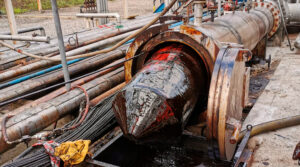In the realm of modern agriculture, efficiency and sustainability are paramount. Farmers constantly seek ways to optimize their operations, improve productivity, and minimize environmental impact. One often overlooked aspect of farm management is the maintenance of pipelines used for irrigation, fertilization, and pesticide application. Over time, these pipelines can accumulate various contaminants, leading to reduced efficiency and potential risks to crop health. Chemical cleaning of pipelines emerges as a crucial solution in ensuring the smooth functioning of farm operations. In this article, we delve into the reasons why farms may need chemical cleaning of pipelines, its importance, methods, and the benefits it brings to agricultural practices.
Understanding Pipeline Contamination
- Over time, pipelines in farms can accumulate sediment, biofilm, mineral deposits, and organic matter.
- Sediments can originate from soil particles, fertilizers, pesticides, and organic residues.
- Biofilms, composed of microbial colonies, can form on pipeline surfaces, affecting water flow and quality.
- Mineral deposits, such as calcium and magnesium, can precipitate from water, causing blockages and reduced flow rates.
- Organic matter, including algae and plant debris, may decay in pipelines, leading to foul odors and contamination.
Effects of Pipeline Contamination
- Reduced water flow and pressure, leading to inefficient irrigation and fertilization.
- Increased risk of clogging, which can disrupt operations and necessitate costly repairs.
- Contaminants in pipelines can leach into water sources, affecting crop health and environmental quality.
- Biofilm formation can harbor pathogens, posing risks to human health and crop safety.
- Accumulated deposits can corrode pipelines, shortening their lifespan and requiring premature replacement.
Importance of Chemical Cleaning
- Chemical cleaning offers an effective method for removing stubborn contaminants from pipelines.
- Unlike mechanical methods, chemical cleaning can reach inaccessible areas and dissolve various types of deposits.
- It helps restore optimal water flow, pressure, and quality, ensuring uniform distribution of irrigation water and fertilizers.
- Chemical cleaning can mitigate the risk of biofilm formation and reduce the need for frequent maintenance.
- By maintaining clean pipelines, farmers can enhance crop yields, minimize resource wastage, and promote sustainable farming practices.
Methods of Chemical Cleaning
- Acid Cleaning: Involves the use of acidic solutions to dissolve mineral deposits and scale buildup.
- Alkaline Cleaning: Utilizes alkaline solutions to break down organic matter and grease deposits.
- Surfactant Cleaning: Incorporates surfactants to disperse and remove contaminants from pipeline surfaces.
- Biocide Treatment: Targets microbial growth and biofilm formation using antimicrobial agents.
- Chelating Agents: Employed to sequester metal ions and prevent their precipitation on pipeline surfaces.
Implementation of Chemical Cleaning in Farming
- Before initiating chemical cleaning, farmers should assess the extent of contamination and choose suitable cleaning agents.
- Proper safety measures must be observed, including wearing protective gear and ensuring ventilation in enclosed spaces.
- Chemical cleaning can be performed using manual methods or automated systems, depending on the scale and complexity of the pipeline network.
- After cleaning, thorough rinsing is essential to remove residual chemicals and prevent contamination of irrigation water.
- Regular monitoring and maintenance are necessary to prevent the recurrence of contamination and ensure long-term pipeline integrity.
Benefits of Chemical Cleaning
- Improved efficiency and effectiveness of irrigation and fertilization systems.
- Enhanced crop yields and quality due to optimal nutrient delivery and water distribution.
- Reduced energy consumption and operating costs associated with pump operation and pipeline maintenance.
- Minimized risks of crop damage and yield losses attributed to clogged or contaminated pipelines.
- Compliance with regulatory standards for water quality and environmental protection, fostering sustainable farming practices.
Conclusion
In conclusion, chemical cleaning of pipelines plays a vital role in maintaining the efficiency, reliability, and sustainability of farming operations. By addressing the challenges of contamination, including sedimentation, biofilm formation, and mineral deposits, farmers can optimize water and resource management while safeguarding crop health and environmental integrity. Implementing regular chemical cleaning protocols not only enhances operational efficiency but also contributes to long-term profitability and resilience in agriculture. As the agricultural sector continues to evolve, embracing innovative solutions like chemical cleaning underscores the commitment to responsible stewardship of resources and the pursuit of agricultural excellence.


